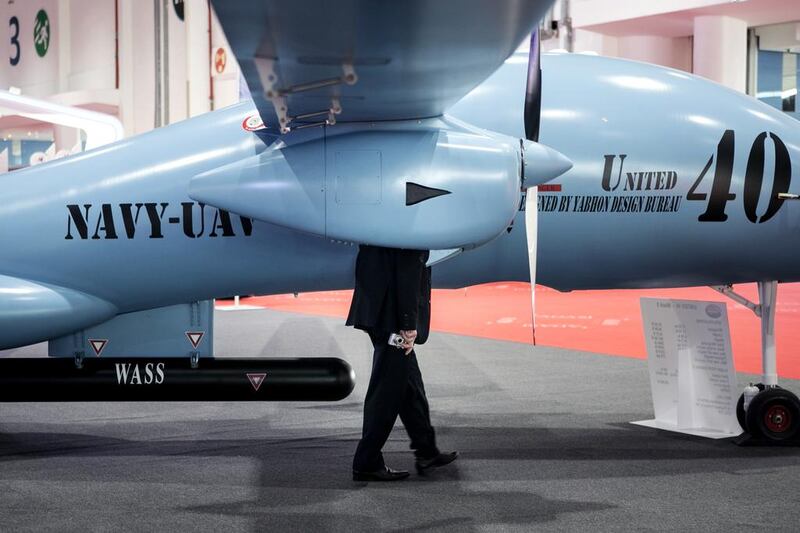Sales of unmanned aerial vehicles (UAV) and associated equipment are set to rise as instability in the Mena region drives governments to upgrade their military capabilities.
The Mena region is following the global trend, using more UAVs, or drones, in conflicts and for commercial use.
The production value for drones is expected to reach US$93 billion in the next 10 years, said the Teal Group, an aerospace and defence consulting company.
In Mena, the UAE and Saudi Arabia are leading in terms of military spending and they are likely to be the main buyers of drones. In this year’s budget, Saudi Arabia has allocated 213.4 billion riyals (Dh208.98bn) for military and security spending, a quarter of its budget and its single biggest spend.
While the UAE does not divulge its military budget, the country yesterday signed defence deals worth more than Dh767 million during the second Unmanned System Exhibition (Umex) in Abu Dhabi. Among the winners was state-owned Abu Dhabi Autonomous Systems Investments, or Adasi.
Brigadier General Rashid Mohammed Al Shamsi, the chairman of the higher organising committee of Umex, said he expected higher sales at this year’s event compared with last year’s show, which was held alongside the International Defence Exhibition (Idex). The UAE’s military and defence spending power is unlikely to be affected by the drop in oil prices, exhibitors said.
For the Abu-Dhabi-based private group Adcom Systems, the business of UAVs is booming, with year-on-year sales growing fourfold, according to its chief executive, Ali Al Dhaheri.
The big demand for drones and associated equipment is driving the company to look for new locations for large-scale production in places such as India, the UK and Egypt.
“In this coming year, it [sales] will be outstanding because of the situation in the Middle East,” said Mr Al Dhaheri. “You see the American trend and the international trend is going for unmanned aircraft.”
The company’s drones are used for military and commercial operations.
The US defence company Lockheed Martin is holding talks with Saudi Arabia and the UAE to sell its range of drones, said Frank Crisafulli, the head of international development ship and aviation systems.
“Demand in the GCC is high because of the geopolitical events happening right here,” said Mr Crisafulli. “The commercial market is going to be the highest-growing market in the Gulf region, but the dollar amounts are in the military.”
Denel, South Africa’s biggest defence equipment manufacturer, is also looking to sell its Seeker 400 UAV – an upgrade of its Seeker 200 – in the region.
“We definitely expect sales in the region,” said Sepanki Pheto, the business development manager for North Africa and Middle East at Denel Dynamics, a unit of Denel.
“Reconnaissance is necessary in the region because of all the instability that is happening.”
For the Sharjah-based boat manufacturer Al Marakeb, unmanned surface vehicles (USV) production is expected to rise by 15 per cent a year for the next three years after a joint venture with US-based defence company Raytheon was announced under an offsets programme from the Abu Dhabi-based and state-owned investment company Tawazun.
Under the joint venture, Al Marakeb will build the USVs and Raytheon will provide the sensors and technology.
The company, which is targeting sales in Mena and the Far East, expects 70 per cent of the sales to come from military organisations such as the coastguard and the rest from companies including those in the oil and gas sector.
“A navy, an oil company or any security asset, they are buying boats anyway,” said Basel Shuhaiber, the managing director of Al Marakeb. “These [USVs] are just more economical because you are reducing your operational costs.”
dalsaadi@thenational.ae
Follow The National's Business section on Twitter





